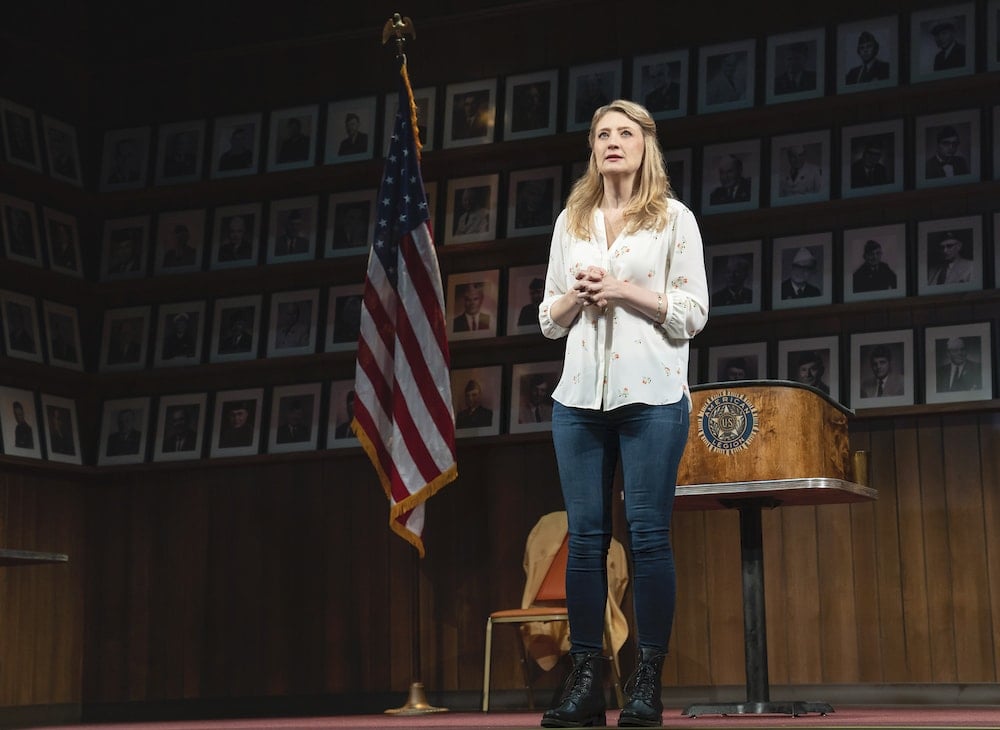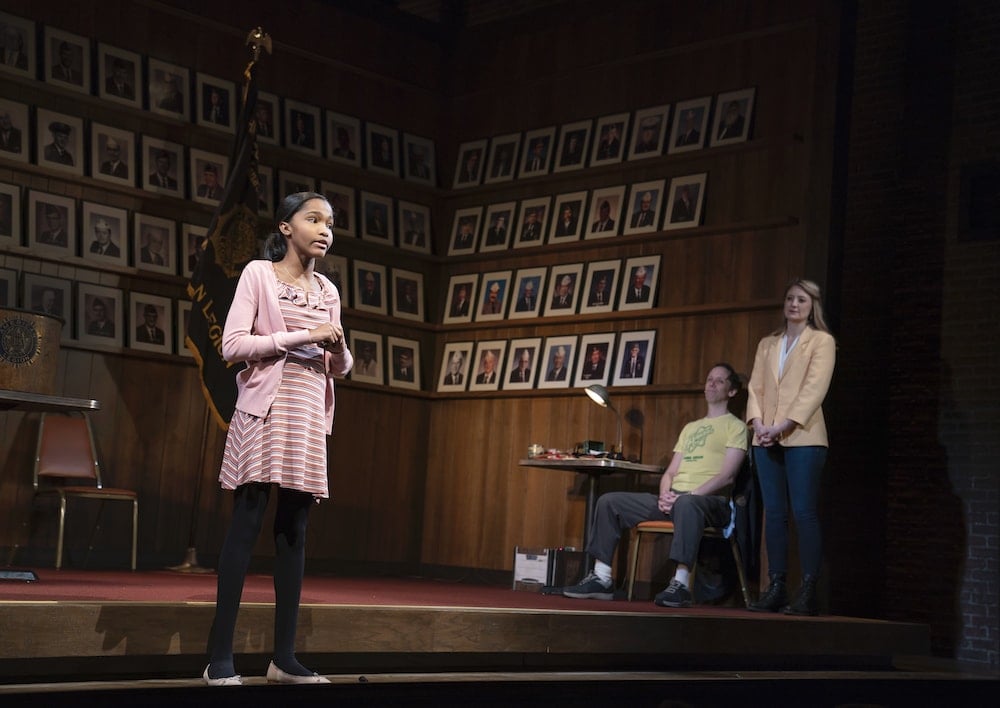This tense election season has been made all the more nerve-wracking by our president’s persistent dissing of the Constitution he swore to uphold. Short of a landslide shellacking, Heidi Shreck’s What the Constitution Means to Me is the perfect rebuttal. If you missed this brilliant show last year at The Kennedy Center, here’s your chance: It’s streaming right now on Amazon Prime.
The Miracle of ‘What the Constitution Means to Me’ at The Kennedy Center
Originally published September 16, 2019
When Heidi Shreck steps out onto the Eisenhower stage and has what seems an informal, ad-libbed, introductory chat with us, the first thing you notice is her joy. She seems genuinely happy to be here. Putting us utterly at ease, she’s visibly bubbling to share with us her story: how as a 15-year-old in Wenatchee, Washington, she entered debate contests, sponsored by local American Legion posts, that tested and showcased her knowledge of the U.S. Constitution. The rules required that she be as personal as possible. Whatever she said had to be about how the Constitution had affected her own life. Debating agreed with her. She got really good at it. She won enough prize money to put herself through college.

Behind her is a simulated American Legion hall (the unprepossessing set is by Rachel Hauck), its wood-paneled walls filled with framed headshots of white male veterans in uniform. Shreck enters the set and begins to speak as her 15-year-old self giving competitive seven-minute presentations. A nerdy Legionnaire sitting stage left (Mike Iveson) keeps time on his stopwatch. Schreck does not imitate her younger self, but she delivers convincingly the reconstructed words of that whip-smart kid. Under pressure, she gets a little flustered, but she crushes it.
Shreck is incredibly funny, her timing so fine-tuned it could put clocks out of work. She has the audience enthralled. The laughs come fast, one right after another. The slightest pause can turn hilarious. Her humor is dry and self-effacing. “I was raised to be psychotically polite,” she says at one point, explaining why she was smiling when inside she wasn’t.
Intellectually I know that Shreck is giving a practiced, scripted performance. Even when ad-libbing, she has to be acting. She has been directed (efficiently by Oliver Butler) as surely as she has been stage-lit (proficiently by Jen Schriever) and costumed (casually by Michael Krass). She’s playing herself in a play she wrote that became a breakout hit in New York, garnered Tony nominations for best play and best actress, was named a Pulitzer Prize finalist for drama, and now comes to DC for a brief run that’s almost all sold out.

But what is happening in this intimate moment in this vast theater has no artifice, no self-importance, no premeditation. Heidi Schreck is simply being herself, and she is so personable and spontaneous and emotionally transparent it’s as if we have met a new friend.
This bond with the audience is spun of gold, and it never breaks, even when Shreck gets to the core of her case, which is an argument with America’s past. Hers is a debate with the wealthy white men who owned wives and slaves and who wrote a Constitution that left out women, Africans, First Nations, other people of color, and anyone else unlike themselves.
I had read a fair amount about how entertaining and engaging Shreck’s play and performance are—and all of it proved breathtakingly true—but nothing prepared me for the radical critique at the heart of it: a personal and political takedown of the rich white male supremacy that the Framers enshrined in the Constitution.
“What does it mean if this document offers no protections against the violence of men?” Shreck asks—having told us story after story of men’s abuse of women in her family including her mother and going back to her great-great grandmother.
Summarizing nine white men’s judicial groping that finally found in the Constitution a penumbral right to privacy to permit, with limitations, birth control and abortion, Shreck states the obvious: “Our bodies, our bodies, had been left out of this Constitution from the beginning.”
Not for nothing did Gloria Steinem call the show “a miracle.”
And not for nothing did Shreck call the 14th Amendment Equal Protection Clause “the most miraculous clause in our entire Constitution.” So much hope hangs on that clause—civil equality rights for folks of all sorts—but by a thread that can snap, as it did in the 2005 case of Castle Rock v. Gonzales. That was when the Supreme Court decided against a woman who had pled with local police to enforce the restraining order on her threatening husband. The police did nothing. The husband killed her three children.
Feminist legal scholars have called this decision the death of the 14th Amendment for women and children. This ruling is most devastating for women of color, transwomen, binary and non-binary folx, women with disabilities, immigrants — people who are less likely to be helped by police than I am. It’s especially devastating to indigenous women, who suffer the most violence in our country.
Shreck spells out the constitutional-law civics lesson here, simply and clearly:
I learned about two kinds of rights: negative rights and positive rights. Negative rights protect us from the government taking our stuff, locking us up, killing us. Positive rights are active rights. They include things like the right to a fair trial, the right to counsel, in some countries the right to health care. Our Constitution primarily, with some exceptions, is a negative-rights document, and Scalia, an originalist, was adamantly a negative-rights kind of guy, which is in part how they decided that Jessica Gonzales was not entitled to any active protection from the police. I also learned that if we had an Equal Rights Amendment, she might have been protected under that. And I understood for the first time why my mom cried when it didn’t pass.

At points two other performers take the stage. Midway through, Mike Iveson drops his Legionnaire guise and shares, as himself, his own story of being punched in the face for not presenting as male enough. And at the end, an extraordinary 14-year-old named Rosdely Ciprian, a dynamo debater in her own right, has a delightful scene with Shreck during which they toss a coin to decide who should argue for abolishing the Constitution or for keeping it.
What the Constitution Means to Me not only talks back to hundreds of years of American patriarchal history and jurisprudence; it also speaks to the present moment:
Democracy is something we have to make happen, we have to fight for, every single day.
What the Constitution Means to Me is the most necessary work of American theater of this century so far, and it is essential viewing for anyone who cares about the tenuous future of equality.
Running Time: One hour 55 minutes, with no intermission.
What the Constitution Means to Me runs through September 22, 2019, at the John F. Kennedy Center for the Performing Arts Eisenhower Theater — 2700 F Street, NW in Washington, DC. The few remaining tickets for the run are available online or by calling (202) 467-4600 or (800) 444-1324.
What the Constitution Means to Me will launch a national tour—with an actor to be announced in Heidi Schreck’s role—at the Mark Taper Forum in Los Angeles in January 2020, with stops to follow in Charlotte, Hartford, Philadelphia, Pittsburgh, with more to be announced.
The script published by Theater Communications Group will be available November 5, 2019.




